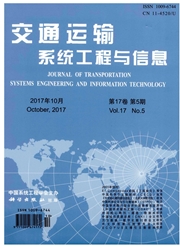

 中文摘要:
中文摘要:
我国海洋外贸运输在全球外贸运输中发挥重大作用,而港口是国际物流运输的重要环节.基于状态空间模型,考察了金融危机之前及之后,国际、国内主要宏观因素对我国沿海港口外贸货物吞吐量的影响轨迹.结果发现:自金融危机以来,世界经济状况对我国沿海港口外贸货物吞吐量的边际正面影响在逐渐提高,外商直接投资的边际正面影响明显减弱,人民币实际有效汇率指数波动的边际负面影响在减弱,国内经济状况的边际正面影响逐渐减弱,沿海交通建设固定资产投资的边际正面影响在增强.基于实证结果,得出我国经济由外需拉动向内需推动转型的间接证据并提出政策建议.
 英文摘要:
英文摘要:
China's ocean transportation for international trade plays a major role in global transportation for international trade, and port is the important link in international logistics transport. The international and domestic macroeconomic factors and their time impact trajectories on China's foreign trade cargo handled at coastal seaports are investigated based on the state space model. The main findings are as follows. Since the financial crisis, the positive impact of world economic growth on China's foreign trade cargo handled at coastal seaports is increased; the positive impact of the actual use of foreign direct investment is significantly weakened; the negative impact of fluctuations in the RMB nominal effective exchange rate is weakened; the positive impact of domestic economic growth is gradually weakened; the positive impact of investment on coastal transportation is increased. We obtain an indirect evidence for the transformation of China's economic development from the empirical results, i.e. China is transforming from an export- orientationeconomy to a home-demand-economy, and then proposes the relevant policy recommendations.
 同期刊论文项目
同期刊论文项目
 同项目期刊论文
同项目期刊论文
 A Comparison of Producer, Consumer and Shared Responsibility Based on aNew Inter-Country Input-Outpu
A Comparison of Producer, Consumer and Shared Responsibility Based on aNew Inter-Country Input-Outpu 期刊信息
期刊信息
